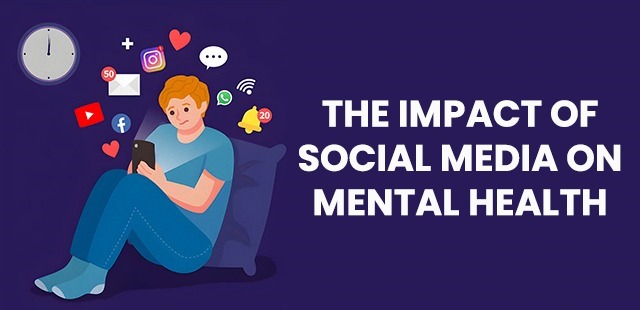The Impact of social media on Mental Health
In today’s interconnected world, social media has become an integral part of our daily lives. From sharing experiences to staying in touch with friends and family, it has transformed the way we communicate and interact. While social media offers numerous benefits, it also has a profound impact on our mental health.
It is important to understand the effects to safeguard our well-being.
Feeling of Inadequacy and Comparison
One of the most significant effects of social media on mental health is its potential to foster feelings of inadequacy and comparison. As we scroll through carefully curated feeds filled with snapshots of seemingly perfect lives, it’s easy to fall into the trap of comparison.
This constant exposure to the highlight reels of others can lead to a negative self-perception, as individuals may start to believe that their own lives are not as exciting or fulfilling. This can trigger feelings of envy, inadequacy, and even lower self-esteem.
Stress and Anxiety
Furthermore, the constant barrage of information and opinions on social media can contribute to heightened levels of stress and anxiety. The relentless stream of news, often sensationalist and exaggerated, can fuel a sense of fear and uncertainty.
Additionally, the pressure to stay updated and connected at all times can create a fear of missing out (FOMO), leading to an overwhelming sense of being left behind or excluded.
Loneliness and Isolation
Social media can also lead to increased levels of loneliness and isolation. The virtual connections provided by social media can sometimes hinder the development of meaningful real-life relationships.
Excessive reliance on digital interactions may replace face-to-face communication, leading to a lack of genuine human connection and emotional support, ultimately resulting in feelings of isolation and detachment.

Cyberbullying and Online harassment
The rise of cyberbullying and online harassment has become a pressing concern in the digital age. The anonymity and perceived distance provided by social media platforms can embolden individuals to engage in harmful behaviour, causing significant emotional distress for the victims.
The constant exposure to negative comments and harmful content can deeply affect one’s self-esteem and mental well-being, leading to long-term psychological consequences.
On the other hand, it’s essential to acknowledge that social media also provides a platform for positive interactions and support. It can foster a sense of community, allowing individuals to connect with like-minded people and find support networks for shared interests and experiences. Through various online communities and support groups, individuals can find solace, guidance, and encouragement, ultimately contributing to their mental well-being.
To mitigate the adverse effects of social media on mental health, adopting a mindful
approach is crucial.
- : – Set healthy boundaries by limiting screen time.
: – Prioritise real-life connections to maintain a healthy balance between the digital and physical worlds.
: – Cultivate self-awareness and practice self-compassion to aid in combating the detrimental effects of comparison and unrealistic expectations.
: – Be selective about the content consumed and curate a positive online environment for a healthier online experience.
: – Unfollow accounts that evoke negative emotions, follow accounts that promote positivity and authenticity.
: – Engage in meaningful discussions to foster a nurturing online space.
Conclusion
While social media has undoubtedly revolutionized the way we connect and communicate, it’s essential to recognize its potential impact on mental health. By striking a balance between virtual interactions and real-life connections, we can navigate the digital landscape with resilience and mindfulness, fostering a healthier relationship with social media and ourselves.
